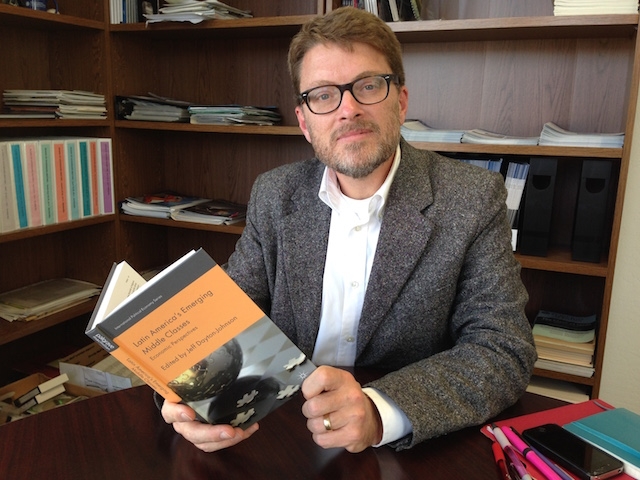New MIIS Leader Jeff Dayton-Johnson’s New Book on Latin America’s Emerging Middle Class

When Jeff Dayton-Johnson started working on Latin America’s Emerging Middle Classes: Economic Perspectives (Palgrave Macmillan, 2015) three years ago, he was a professor of international policy studies at the Monterey Institute of International Studies.
International Policy and Development. A lot has changed, in other words, but Dayton-Johnson’s deep interest in examining socio-economic issues in Latin America abides.
“As described in the preface, the book began as a conversation about what it means to be middle class in the developing world,” says Dayton-Johnson. “The initial conversation happened among fellow staff members at the OECD Development Centre, where I was serving as the head of the Americas desk, and then spread to include representatives of a number of Latin American governments.”
The issue these policy-makers were grappling with were fundamental: people disagreed with the OECD’s definition of “middle class” and took issue with its characterization of the middle class as it existed in Latin America. The conversation that emerged played right into one of Dayton-Johnson’s chief research interests. “The number one thing that has always interested me about the economy is inequality, and the exclusion and poverty that go with it, which we often see very starkly in Latin America,” he says. “I wanted to examine potential ways that public policy makers—and our students, many of whom will later move into positions of influence over policy—can address inequality.”
The book is designed to be interdisciplinary and of interest to students of sociology or development economics or political economy. “It’s really geared for the professionally-oriented student who wants to go out and change the world, like our students here at the Middlebury Institute,” adds Dayton-Johnson.
Latin America’s Emerging Middle Classes features a number of notable scholars of Latin American development, as well as two authors who are currently sitting cabinet members in their respective nations. Mauricio Cárdenas began working on his chapter (“Latin America’s Global Middle Class: A Preference for Growth over Equality”) while at the Brookings Institution; he is now the minister of finance in Colombia. While working on his chapter (“Brazil’s New Middle Classes: The Bright Side of the Poor”), Marcello Neri was named minister of strategic affairs in the cabinet of Brazil.
his new role as vice president for academic affairs and dean of the Institute in November, succeeding former president Sunder Ramaswamy, who stepped down effective January 31.
For More Information
Jason Warburg
jwarburg@middlebury.edu
831.647.3156
Eva Gudbergsdottir
eva@middlebury.edu
831.647.6606
